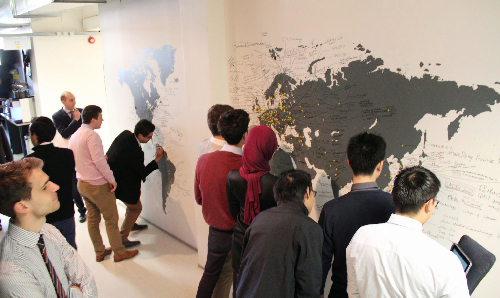Coming through Border Control, as I did recently when I moved from Australia to start work at Cambridge Enterprise, usually means having to explain tech transfer. ‘Technology Transfer Associate?’ the border agent will typically ask, scanning my landing card. ‘What do you actually do?’ and ‘Does such a job actually exist?’
It sure does. And the more I travel, the more diversity I see in the ways technology and knowledge are transferred. This diversity, I believe, reflects the social and business environment in which Technology Transfer Offices (TTOs) all over the world operate.
University TTOs almost always have a mission to contribute positively to society and the economy, through the dissemination of knowledge via the most appropriate means—often commercialisation. This could lead to the formation of spin-out companies, which then seek funding to further develop the technology, or licensing to an older company, which takes a gamble on a technology, often assuming all liability and getting no warranty. Depending on the local social and business appetite for risk, such investments can lead to different TTO strategies to maximise dissemination.
In ‘risk tolerant’ societies and business environments, such as the USA and Israel, exclusive rights to a technology that could disrupt a market is often reason enough to take the gamble. I think of this as having a ‘you have to be in it to win it’ mentality.
However, in a comparatively risk-averse business culture such as Australia’s, attitudes can be far different. Taking a gamble on licensing early-stage, University-developed concepts and technology with unknown odds for success, combined with high market uncertainty (especially if no market exists yet) is seen as irresponsible. Especially so considering that down the road, the bookies will pay out known odds based on live statistics and will often offer a refund if the result is a draw.
Therefore it is no surprise to see UNSW Innovations, the TTO of the University of New South Wales, Sydney, adopt the ‘Easy Access IP’ strategy as its core approach to knowledge exchange and default mechanism for industry engagement. At its most basic, this strategy offers a free license to a majority of the research output of the University for three years, provided that the licensee demonstrates how it will create value for the society and economy. There are a few other basic terms, but the whole license is typically a single page. Though Easy Access IP has its critics, I see this approach being accepted in Australia as it allows companies to feel they are taking a ‘free bet’ on university research and initiate collaborative relationships that could lead to larger investments down the track.
My next example comes from MEKTORY, or ‘Modern Estonian Knowledge Transfer Office foR You’ —the TTO of Tallinn Technical University, Estonia. Faced with the challenge of developing commercial and entrepreneurial experience in a traditionally technically minded society, MEKTORY runs programmes across all age groups (6 years and up) sponsored by over 50 companies, including major multinationals, all under one (large) roof. Such programs focus on teaching school children, university students, faculty and industry partners ‘how to see’ opportunities to apply technology to effect change and on providing the commercial and entrepreneurial knowledge to carry it out.
The result is over 30 ‘blue-sky’ R&D projects that are directly commercialised out of MEKTORY every year and the democratisation of technology and practical business development experience to help convert entrepreneurial ideas into social and economic benefit.
Leveraging Estonia’s small size, MEKTORY is also able to function as a one-stop, industry-meet-academia network hub and entrepreneurial education centre for the whole country. It attracts interest from learning institutions and industry from all over the world—over 150,000 visitors from 150 countries since opening.
I’ll wrap up by making my own observation on how Cambridge Enterprise (CE) has adapted to its local environment. With an enviable reputation and brand, attracting some of the brightest minds and industry interest, Cambridge is not short of great ideas, nor the funding to take them forward commercially.
Unlike other universities, which often require their academics to commercialise their research through their TTO, Cambridge allows academics to opt out and commercialise their research without CE. The result, I believe, is a TTO that allows the highly entrepreneurial academics to ‘have a go’ themselves whilst ensuring that those who require guidance are not left behind. It also places the onus on CE to continuously deliver quality and effective services. This includes training and development activities to help academics understand that commercialisation is a means of achieving impact and disseminating knowledge.
So there you have it: three countries, three unique challenges and three different ways to support Tech Transfer. As I plan to travel to many more countries to experience new cultures and meet new people, I hope to find new recipes and ideas to best support the local transfer of technology and knowledge and encourage entrepreneurism.











